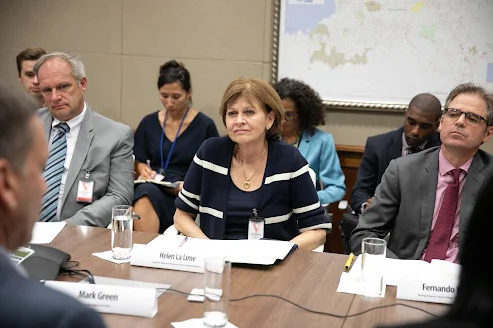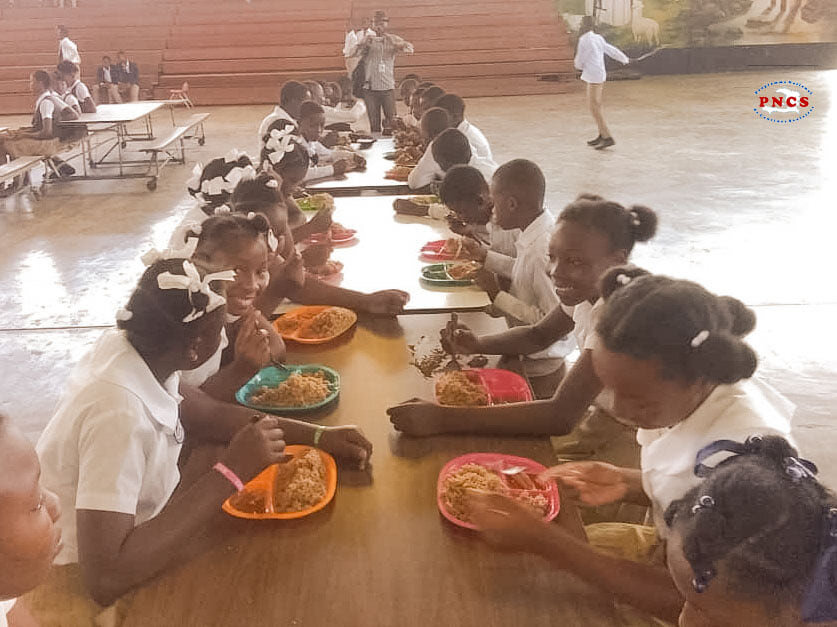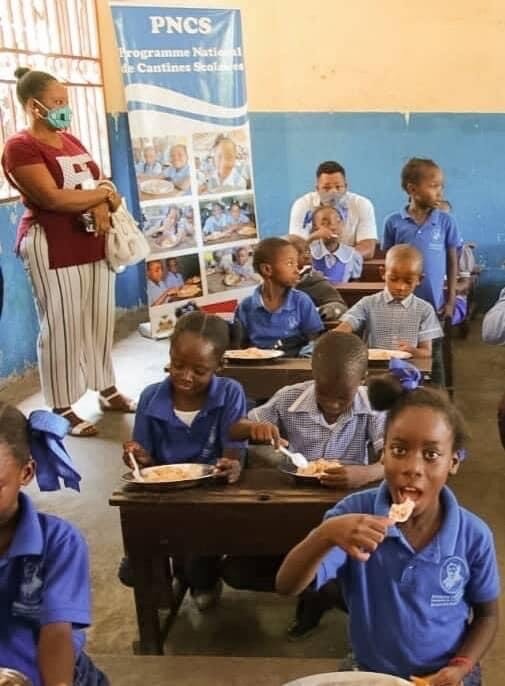Tout sa nap viv nan peyi d’Haiti jodia se konsekans yon Leta ki efondre akoz :
1- GLOBALIZASYON NEO-LIBERAL
Depi ane 1980 blan ap bay dirijan aysyen presyon pou kraze tout strikti sosyal, ekononik, sekirite kite pèmet Haiti reziste depi li pran lendepandans;
- 1980, yo egzije Duvalier touye tout kochon kreyol yo; Bagay sa bay tout bidonvil, getto oubyen katye popilè nou wè nan kapital la ak nan vil yo. (Jodia gen fyèv pòsin afriken Sendomeng, yo pa di Dominiken yo touye tout kochon yo genyen)
- 1986, yo fè Duvalier kite pouvwa san okenn planfikasyon; (Tandiske pou Sendomeng, yo planifye ak klas politik la pou diktatè Balaguer ale san kraze brize)
- 1986, blan fòse gouvènman jeneral Henry Namphy louvri ekonomi Haiti, pou'l kite tout pwodi agrikòl meriken tankou diri ak pwa Miami anvayi peyi-a epi kraze agrikilti nou; komès pèpè detri pwofesyon tankou kouti, tayè, kite konn ede anpil moun reziste;
- 1986 a 1995, yo manipile militè FADH pou fè koudeta. Menm Pwofesè Manigat pa’t epaye. Epi, tout moun ka wè kòman yo trete militè ki pat dakò ak pratik Koudeta yo. Anpil nan ofisye sa yo mouri mal, apre laprès fin detri imaj yo;
- Pandan yo pat aksepte Aristide rekipere 3 lane koudeta li te pase an egazil, blan an aksepte li kraze lame d’Ayiti #FADH, lite kraze sistèm chèf seksyon. Bagay sa destabilize sekirite peyi-a kote depi 1995 gang yo ranplase kazèn militè nan tout peyi-a; (Tandiske pou Sendomeng, yo tabli demokrasi san kraze enstitisyon sekirite ke Diktatè Jeneral Rafael Trujillo ak Joaquin Balaguer te kreye. Jodia, se sèvis sekrè dominiken ke Trujillo te kreye kap bay sekirite Sendomeng. Lame ak milisyen sivil dominiken toujou ap kore lapolis nan bay sekirite. An Haiti, blan pa vle lame, blan pa vle sèvis sekrè ak tout moun ap viktim ensekirite. Eske bagay sa pa yon konplo pou kraze peyi Dessalines kite pou nou an?)
- 1996 - 2001, Prezidan René Préval destabilize administrasyon piblik la ak sa li te rele “Depart volontaire”. Bagay sa lakòz Leta pedi yon bann anplwaye konpetan, brit-sou-kou san okenn planifikasyon. Depi lè sa Leta gen yon kriz Kontraktyèl paske anpil moun Lavalas mete nan administrasyon an paka fè travay yo. Politisyen sevi ak bagay sa pou manipile jenn militan.
- Depi apre retou prezidan Aristide an 1995, blan pa fè anyen pou peyi-a. Yo regle koze yo ak Aristide/Lavalas epi chita bay presyon pou yo vann tout antrepriz Leta te genyen, tankou ASCO, ACIERIE D’HAITI, MINOTERIE, TELECO, menm EDH.
Bagay sa yo fè Leta pa gen mwayen pou ede moun ki pi fèb yo. Jenn nan katye popilè yo pagen kote pou al chache travay, menm lame yo pagen ankò pou yo rantre, yo paka jwenn èd Leta, yo pedi tout lyen sosyal.
Paske sektè prive enpòte tout bagay, Lekòl pwofesyonèl kite konn travay pou izin Leta yo efondre, kidonk jenn yo oblije rantre nan delenkans, pwostitisyon ak gang kriminèl pou yo ka viv.
Dayè, televizyon ak sinema ki soti nan peyi etranje, chanje fason yo panse, fè yo kwè nan konsome san rete bèl tenis, bel machin, bel telefon, bwè bweson entranje, nan yon peyi kote pagen travay, kote se chomaj toupatou;
- Sak pi grav la, depi 1986, blan kominote entènasyonal fè tout èd yo pase pa ONG ke boujwa salòp yo kontwole;
Kidonk, pèp aysyen pa janm jwenn anyen nan swadizan èd sa yo ki se mwayen pou anrichi boujwazi ak domestik yo gen nan klas mwayèn Repilbik Pòtoprens ki toujou gen prejije kont peyizan, gade moun pwovens tankou tèt kanna.
- 2006 - 2011, Prezidan René Préval fè boujwazi salòp ak oligak kowonpi yo kado tout antrepriz Leta te konstri ak lajan taks pèp la.
- Kòm rezilta, Leta peyi d’Haiti pagen mwayen pou ede moun ki fèb yo. Ti mwayen moun nwa te genyen pou yo evolye nan sosyeta sa vin nan men boujwazi salòp ki kontwole tout pò APN, Dwan, Bank Santral, Ministè finans, LakouDekont, Komisyon mache piblik, lajistis, elatriye. Yo tranfòme Lapolis an sekirite prive yo, jij yo se timoun ki rete ak yo ki kenbe malere na prizon sa jije tandiske yap pran desizyon nan enterè boujwa salòp, oligak ak milat kòwonpi.
Pandan lane ki pase yo, tout moun wè kòman boujwazi-a achte zam san rete pou gang. Se chak jou yap dekouvri zam kap pase nan Dwan peyi d’Haiti. E sa ladwann pa janm sezi yo? …sa ki pase nan kontenè sou fwontyè ak Sendomeng?
Pandan tan sa, boujwazi salòp la, oligak kowonpi yo, konstri radyo pou bay manti lave sèvo pèp la, kote yo toujou ap akize Leta. Aloske Leta se yo. Tout bagay nan men yo, tout desizyon toujou anfavè yo. Men, sa pa ase. Yo chita ap manipile nou, fè nou kwè ke se dirijan politik tankou prezidan ki lakòz Haiti kote li ye la. Anpil radyoman aksepte fè vye djòb sal sa. Jodia konsyans radyoman yo fè yo paka dòmi. Tout moun ka wè kòman chak fwa yon dirijan politik oubyen prezidan deside atake sistèm lan, yo asasinen’l. Sa pwouve pawòl se paske dirijan yo pagen volonte pou pran desizyon an pa chita sou anyen. Paske sa ki vle pran desizyon yo mouri mal, asasinen pa oligak kowonpi yo. Li klè ke pwoblèm lan se ki minorite anti-chanjman ki nan komin Petion-ville ki bloke peyi-a.
2- KONPOTMAN KRAZE BRIZE KLAS POLITIK LA
Anplis kominote entènasyonal ki fòse nou pran tout vye desizyon sa yo nou sot eksplike la, e ki lakoz Haiti efonse nan labou, genyen konpòtman politisyen aysyen ak nayivte nou menm ki kite yo manipile nou.
Reyalite a : Depi lane 1980, klas politik Haiti domine pa yon seri militan kominis kit'ap viv an Europe, France, Belgique, Suisse, Canada, Mexique. Anpil nan yo te fòme nan Inivèsite Patrice Lumumba, Moscou, nan peyi Union Sovietik ki joida (Russie). Moun sa yo te swiv teknik pou fè “Subversion". Ki se yon seri teknik teroris pou destabilize yon Leta ak yon sosyete. Ak teknik sa yo, ansyen kominis sa yo konnen koman pou yo fè pwopagann manti, entimidasyon;
kòman pou manipile jenn gason ak jenn fi, pouse yo derespekte granmoun yo, fè yo pase tradisyon, kilti ak kominote yo anba betiz;
kòman pou pwovoke lapolis ak lame san rete pou kapab fè yo komèt erè epi deklanche vyolans. Kòman pou fè zak kriminèl epi mete sou do lapolis ak gouvènman;
Apre sa, yap itilize kadav moun ki mouri yo pou deklanche lòt vyolans epi pwovoke Lapolis. Tout zak vyolans tankou atake machanm, elèv lekòl, boule mache, ensekirite…tout bagay sa yo rantre nan kad strateji “subversion” pou destabilize epi chache pran pouvwa.
Nan liv yo rele “La Guerre de sens” ke Jeneral fransè Loup Francart ekri, misye eksplike teknik sa yo. Epi li di sepa bagay pou itilize andedan demokrasi. Li di tou, okenn patriyòt pa dwe itilize teknik sa yo andedan peyi li paske li bezwen pran pouvwa. Paske konsekans operasyon “Subversion" yo grav anpil, yo pral diri plizyè lane, ak anpil konsekans sou fondman peyi-a pandan plizyè deseni.
Pa egzanp, lè w ankouraje jenn pa respekte Lapolis ak lajistis, sa pral kreye gang. Apre batay politik, w pap ka fè yo respekte Lapolis ak lajistis ankò. Tout jenn sa yo pral tounen gang kriminèl pou kreye ensekirite jeneralize. Lidè yo pap ka pale ak yo ankò. Paske depi yo fin goute dezod ak gwo lajan fasil pagen anyen kap ka rete yo ankò.
Se egzakteman sa nap viv an Haiti. Tout gwoup kite kreye depi koudeta 1990, tout sa kite kreye pa Lavalas chak fwa eleksyon rive, tout gang GNB te itilize, tout gang operasyon BAGDAD, gang ke pouvwa toujou itilize pou gen kontwòl kapital la, tout gang opozisyon André Michel, Nenèl Cassy, Evalière Beauplan te konn itilize pou lòk peyi-a pandan 4 lane ki sape la yo, tout gang dwog tankou gang Galil, gang boujwa tankou gang Cliford brandt yo, Gang Dimitri yo, se tout bagay sa yo ki lakòz ensekirite nap viv jounen jodia an Haiti.
Pa okipe moun k'ap di’w se yon sèl moun ki lakòz, se Jovenel ki lakòz. Ensekirite-a se konsekans move politik pouvwa ak opozisyon ki tounen yon kansè nan peyi-a ki anpeche moun envesti pou kreye travay. Aysyen ki nan diapora pa ka retounen nan peyi yo.
KI SOLISYON? KÒMAN NAP KA SOTI NAN SA NOU YE LA?
Solisyon an pase pa yon REVOLISYON KILTIRÈL.
Paske se ouvèti san limit ane 1990 yo ki lakòz akiltirasyon, foli viv tankou blan, fè nou pedi konfyans nan tèt nou…. pou’n korije pwoblèm sa, nou dwe retounen nan rasin nou kise tradisyon ak kilti nou menm aysyen.
Depi nan tan esklavaj, lè nou te nan mawonaj, se tèt ansann kite konn ede nou reziste, ede siviv, bay nou espwa. Nou te konn fè konbit pou nou manje, nou te konn fè defann tèt nou ak brigad vijilans pou bay tèt nou sekirite epi goumen kont kolon blan kap chache remete nou nan esklavaj. Se ak teknik sa yo nou te fè avanse lit pou emansipasyon nwa yo. Ak yo, nou te fè moun respekte nou.
Apre lendepandans, tradisyon sa yo rete nan bitasyon yo, nan lakou yo, nan SEKSYON KOMINAL yo. Nan espas sa yo kise matris peyi-a, sekirite chita sou relasyon moun ak moun. Si yon etranje rantre nan seksyon kominal la, tout moun ap wè sa. Orijin fanmi sete mwayen idantite nan seksyon kominal yo. Tout moun konnen tout moun.
Nou pat menm gen batistè, ni kat idantite. Men koneksyon fanmi w sete mwayen pou idantifye yon moun. Si w pa moun nan zòn nan, w dwe gen yon referans : “kimoun ki vini ave’w nan seksyon an?”
Sa vle di, si tout seksyon nan peyi-a remete vijilans sa sou pye, lap fasil pou idantifye bandi yo, anpeche yo sikile. Y'ap oblije rete kote yo ye a. Nan Martissant oubyen nan Croix-des-Bourquets. Lè sa pwoblèm ensekirite-a ap yon pwoblèm 2 ou 3 seksyon kominal pou lapolis rezoud.
Nou dwe retounen ak kontwòl moun, kontwòl byen kap travèse seksyon kominal nou yo. Lontan, okenn moun pat ka pase yon seksyon san li pagen papye pou bèt lap mennen an.
Nou dwe retounen ak kilti, tradisyon, abitid ki chita sou fanmi, bitasyon, lakou, yon fason pou nou rekonstri espas kote nap viv la. Rekeye solidarite ak konfyans nan kominote yo. Sa ap ede nou mete sekirite, yon sekirite k’ap ede nou relanse aktivite ekonomik nan seksyon yo, ki vle di nan kominin yo. Sa ap ede nou reprann kontwòl komin nou, reprann kontwòl awondisman yo, depatman yo. Finalman n'ap reprann kontwòl peyi nou.
Nou paka chita tann solisyon soti Port-au-Prince. Kapital la pa menm ka ede tèt li, kote se nou li pral ka ede.
W menm kap li teks sa planifye yon chita pale ak moun nan seksyon kominal kote w soti-a, kote wap viv la, pou reflechi sou koman nou pral re-òganize seksyon komininal la epi reprann kontwòl sitiyasyon an.
Sispann reflechi devlopman Haiti tankou lòt peyi ak gwo building. Nou dwe rekonèt ke Haiti kraze nan moman sa. Pou nou fè’l reviv, nou bezwen
1- rekreye kondisyon sekirite a pati sekirite nan chak seksyon kominal;
2- sekirite saaa ap ede nou relanse aktivite ekonomik de baz takou agrikilti, komès;
3- Apre sa nap netwaye lakou nou, netwaye lari yo, menm jan nou netwaye lakay nou chak jou, bale wouze;
4- Pwote sa ak sekirite nap mete nan komin nou yo pral pèmèt diaspora ak touris retounen. Sa pral devlope lòt aktivite;
5- Men tou, nan eleksyon kap vini yo kelkeswa moun ki genyen nou dwe kore li nan travay pou lavi chanje nan seksyon an. Fòk gen stabilite nan seksyon kominal la. Moun ki pedi eleksyon yo dwe mete tèt ansanm ak moun ki genyen yo pou kontinye travay epi evite divizyon. Nou dwe koupe fache ak tout moun ki vle mete zizani andedan seksyon kominal la. Ann bay klas politik Port-au-Prince yon leson demokrasi. Se konsa nou pral mete sou pye NWARIS-DEMOKRATIK la. Yon demokrasi ki chita sou rasin peyi-a kise majorite nasyonal kap viv nan bitasyon, nan lakou yo, ki fòme seksyon kominal yo.
Sa se konsèy jounalis Cyrus Sibert, ki ap travay pou ede’w konprann sa ki mete'w nan tout pwoblèm sa yo, e kisa nou dwe fè ansanm pou nou soti. Paske, pagen blan kap vin ede nou reyalize anyen. Non sèlman blan yo chaje pwoblèm pa yo pou yo jere nan peyi yo, majorite blan yo rasis. Konsa tou, ti nèg kapital ki gen foli blan rasis, ti nèg klas mwayèn kap pran pòz yo paka pale kreyòl yo rasis. Kanta boujwa Petion-ville yo, se yon bann rasis. Tout moun ka wè koman yo trete prezidan Jovenel ak madanm li. Yo gade yo sou aparans, fè awogans ak yo jiska rantre lakay yo pou touye yo. Paske si 7 mwa apre eleksyon Jovenel yo leve kont li, se pa paske lite gentan gen yon move bilan, men sa akòz de orijin li.
Politisyen refize diskite avè’l ak tout li ofri yo 95% nan pouvwa li a. Yo di yo kont li paske li PHTK. Jodia tout moun wè yo ak PHTK ki ofri yo mwen ke sa Jovenel te ofri yo. Kidonk, se orijin li yo pat renmen. Yon bann moun nwa ki soti nan vant pèp la ap imite rasis yo, pou yo ka sanble yo. Yo gen foli milat, yo gen foli blan. Se pou rezon sa yo adopte ideyoloji rasis kont moun nwa kanmarad yo. Kidonk, sèl seksyon kominal yo kapab chanje sa.
Paske, si nan tan lesklavaj yo tekonn itilize raso oubyen yon “Koko Makak" pou fose zansèt nou yo fè sa yo vle, jodia, se asasina milat Petion-ville ap itilize kòm mwayen pou kontwole nou.
Sèl yon revolisyon kiltirèl kapab ede nou reprann kontwòl sitiyasyon politik ak ekonomik peyi sanzèt yo kite moun an. Sèl yon travay de baz nan seksyon kominal yo kapab fè echèk a asasen yo epi fè yo konprann ke Petion-ville pa #Haiti.
VIV AYITI !!!
Cyrus Sibert, Okap, 18 Oktob 2021
WhatsApp : +509 3686 9669
Email : reseaucitadelle@yahoo.fr
Twitter : @reseaucitadelle
https://www.facebook.com/reseaucitadelle







